Examining BP's CSR Initiatives After the Deepwater Horizon Spill
VerifiedAdded on 2020/04/01
|9
|2374
|50
AI Summary
The Deepwater Horizon oil spill was one of the most devastating environmental disasters in US history. This analysis explores how BP addressed its corporate social responsibility (CSR) post-spill through various initiatives aimed at environmental restoration, community support, and regulatory compliance. By evaluating BP's strategies for stakeholder engagement, transparency, and sustainability improvements, this paper assesses the effectiveness of their CSR efforts in rebuilding trust and mitigating long-term environmental impacts.
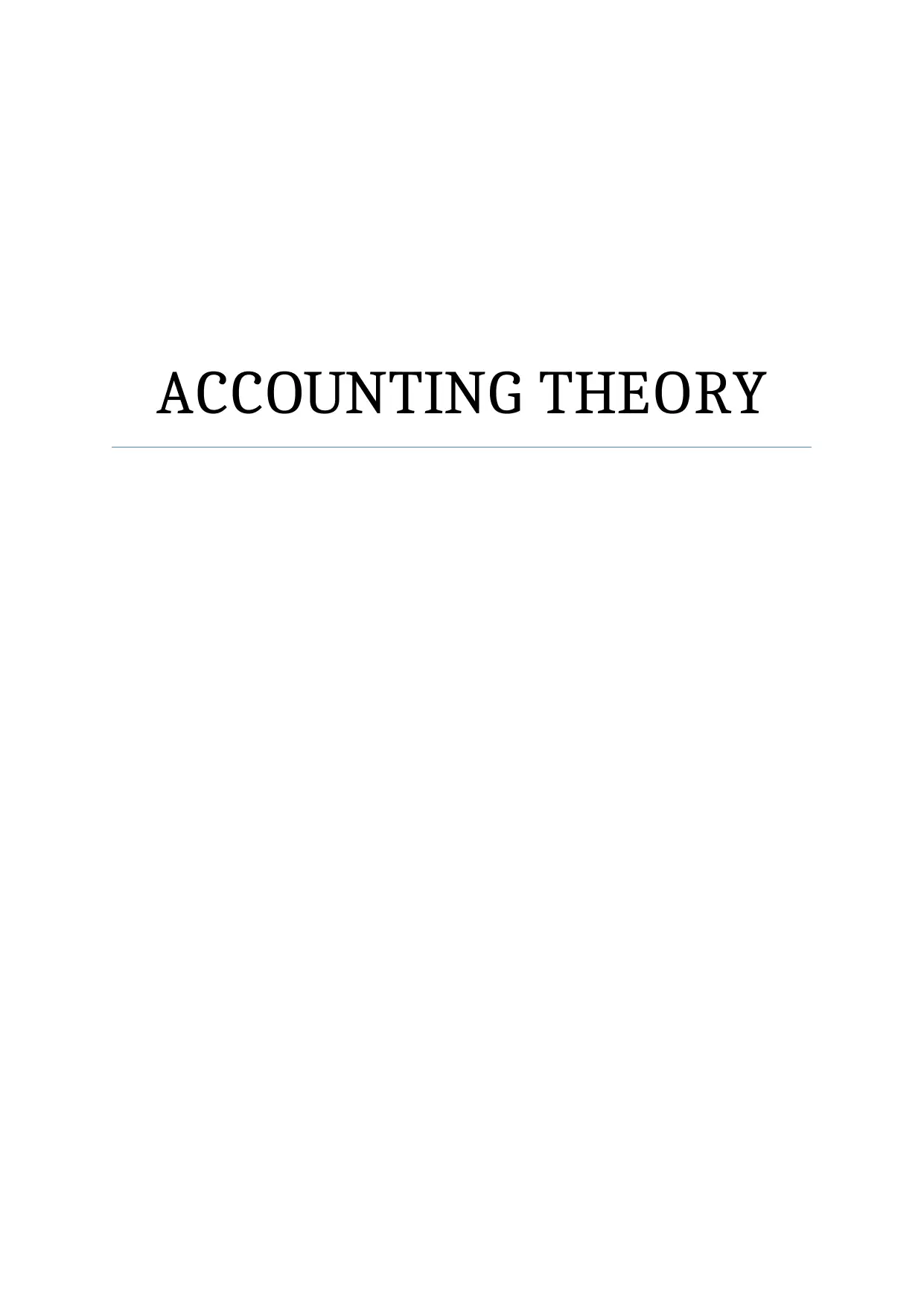
ACCOUNTING THEORY
Paraphrase This Document
Need a fresh take? Get an instant paraphrase of this document with our AI Paraphraser
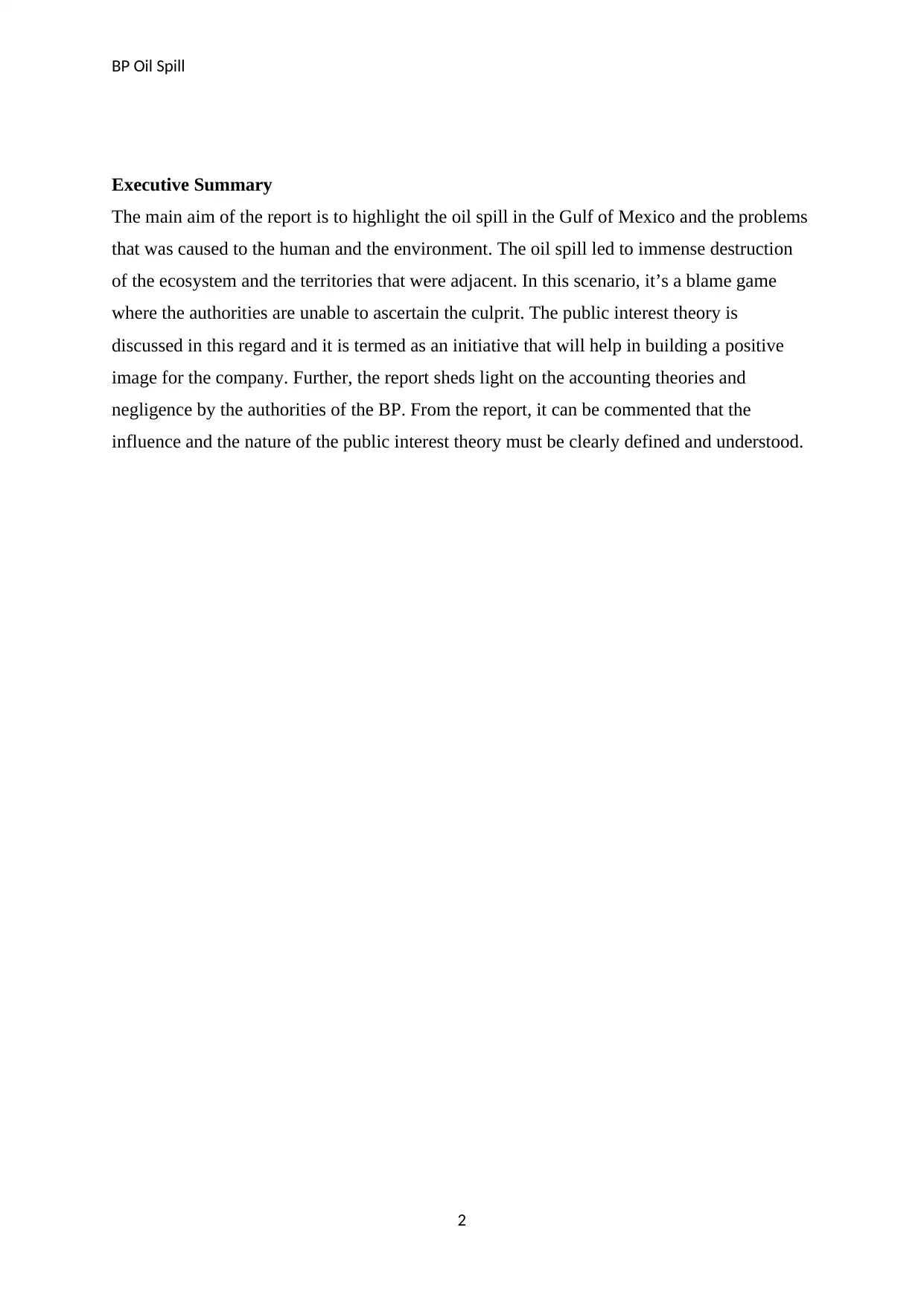
BP Oil Spill
Executive Summary
The main aim of the report is to highlight the oil spill in the Gulf of Mexico and the problems
that was caused to the human and the environment. The oil spill led to immense destruction
of the ecosystem and the territories that were adjacent. In this scenario, it’s a blame game
where the authorities are unable to ascertain the culprit. The public interest theory is
discussed in this regard and it is termed as an initiative that will help in building a positive
image for the company. Further, the report sheds light on the accounting theories and
negligence by the authorities of the BP. From the report, it can be commented that the
influence and the nature of the public interest theory must be clearly defined and understood.
2
Executive Summary
The main aim of the report is to highlight the oil spill in the Gulf of Mexico and the problems
that was caused to the human and the environment. The oil spill led to immense destruction
of the ecosystem and the territories that were adjacent. In this scenario, it’s a blame game
where the authorities are unable to ascertain the culprit. The public interest theory is
discussed in this regard and it is termed as an initiative that will help in building a positive
image for the company. Further, the report sheds light on the accounting theories and
negligence by the authorities of the BP. From the report, it can be commented that the
influence and the nature of the public interest theory must be clearly defined and understood.
2
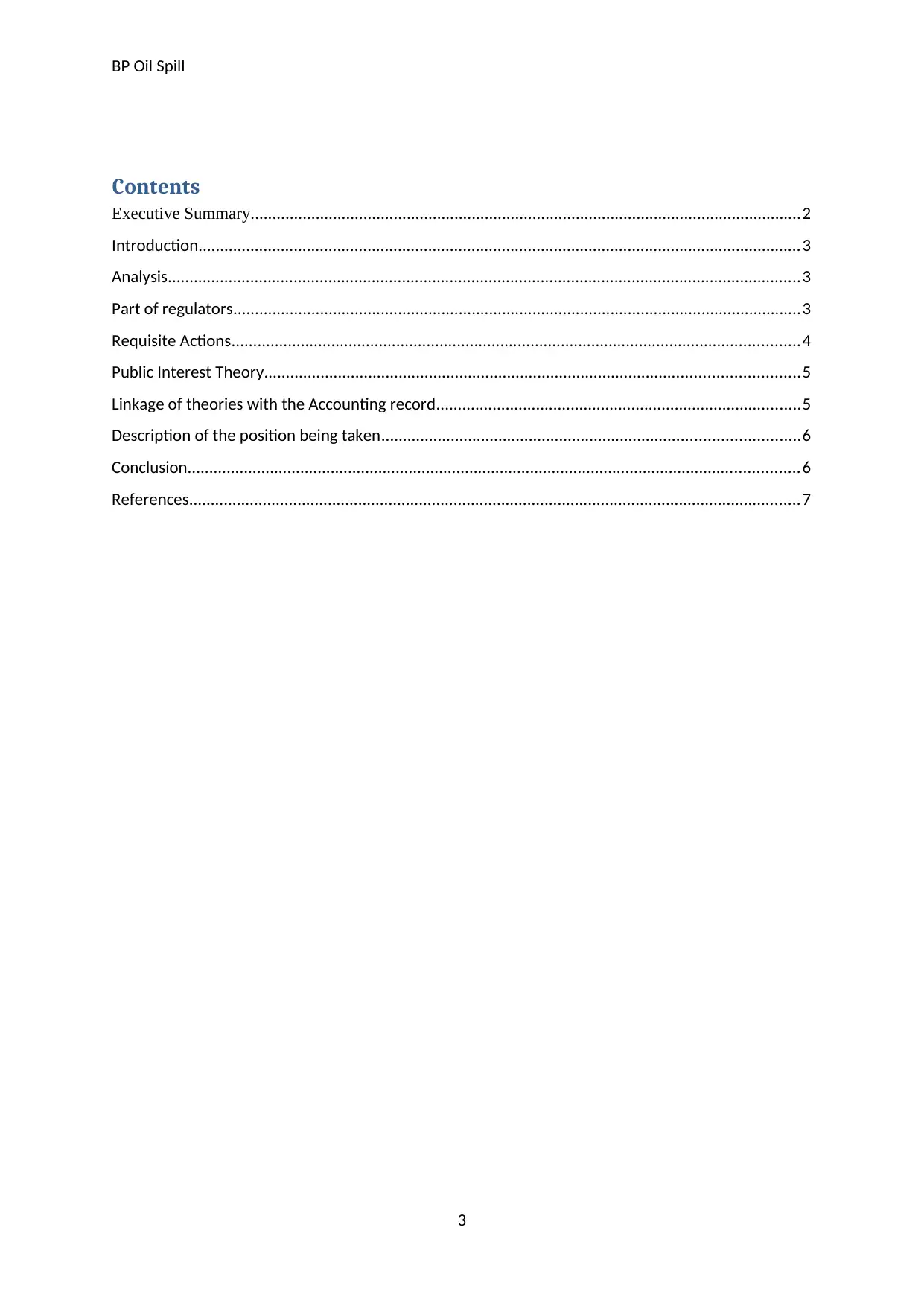
BP Oil Spill
Contents
Executive Summary...............................................................................................................................2
Introduction...........................................................................................................................................3
Analysis..................................................................................................................................................3
Part of regulators...................................................................................................................................3
Requisite Actions...................................................................................................................................4
Public Interest Theory...........................................................................................................................5
Linkage of theories with the Accounting record....................................................................................5
Description of the position being taken................................................................................................6
Conclusion.............................................................................................................................................6
References.............................................................................................................................................7
3
Contents
Executive Summary...............................................................................................................................2
Introduction...........................................................................................................................................3
Analysis..................................................................................................................................................3
Part of regulators...................................................................................................................................3
Requisite Actions...................................................................................................................................4
Public Interest Theory...........................................................................................................................5
Linkage of theories with the Accounting record....................................................................................5
Description of the position being taken................................................................................................6
Conclusion.............................................................................................................................................6
References.............................................................................................................................................7
3
⊘ This is a preview!⊘
Do you want full access?
Subscribe today to unlock all pages.

Trusted by 1+ million students worldwide
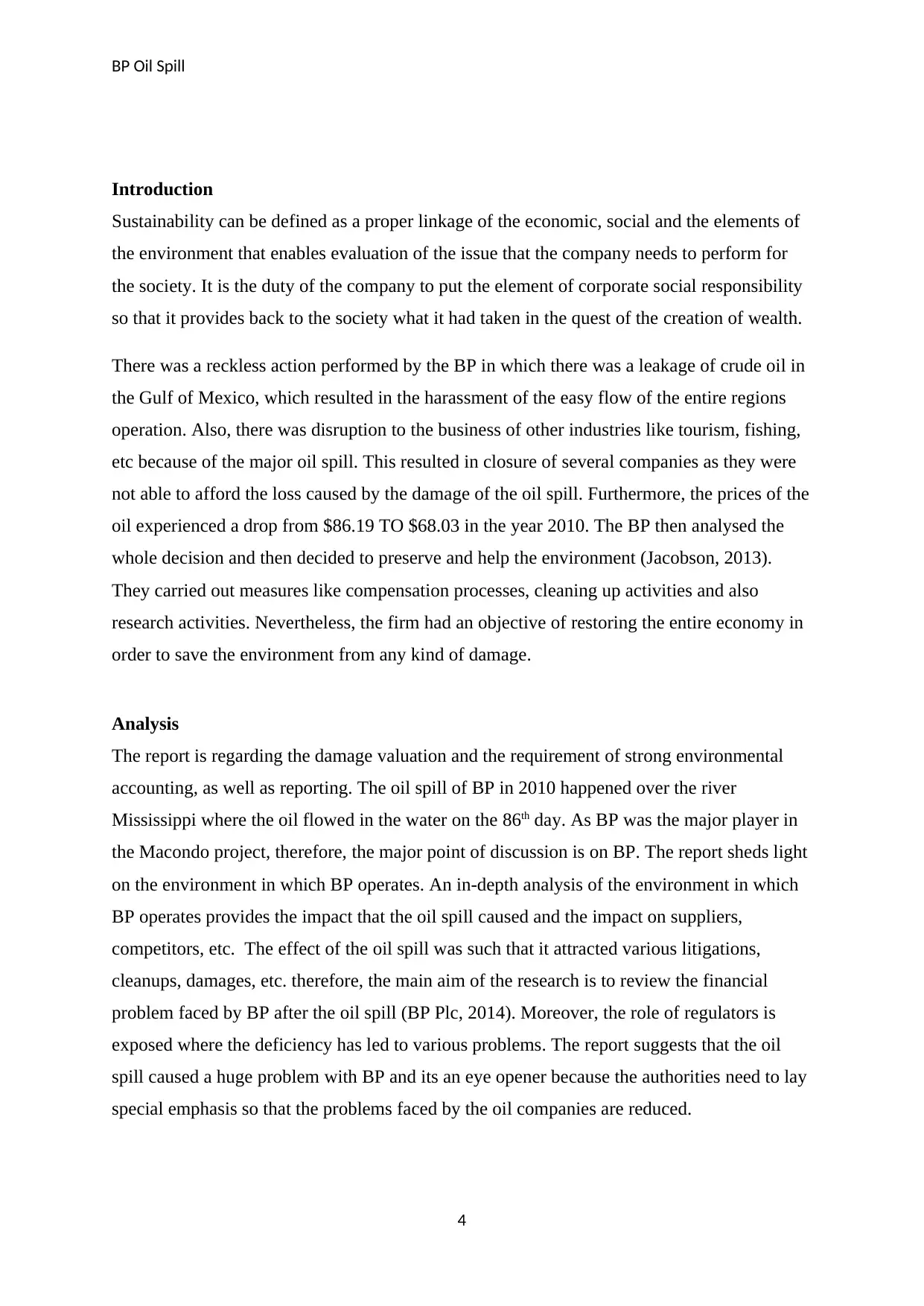
BP Oil Spill
Introduction
Sustainability can be defined as a proper linkage of the economic, social and the elements of
the environment that enables evaluation of the issue that the company needs to perform for
the society. It is the duty of the company to put the element of corporate social responsibility
so that it provides back to the society what it had taken in the quest of the creation of wealth.
There was a reckless action performed by the BP in which there was a leakage of crude oil in
the Gulf of Mexico, which resulted in the harassment of the easy flow of the entire regions
operation. Also, there was disruption to the business of other industries like tourism, fishing,
etc because of the major oil spill. This resulted in closure of several companies as they were
not able to afford the loss caused by the damage of the oil spill. Furthermore, the prices of the
oil experienced a drop from $86.19 TO $68.03 in the year 2010. The BP then analysed the
whole decision and then decided to preserve and help the environment (Jacobson, 2013).
They carried out measures like compensation processes, cleaning up activities and also
research activities. Nevertheless, the firm had an objective of restoring the entire economy in
order to save the environment from any kind of damage.
Analysis
The report is regarding the damage valuation and the requirement of strong environmental
accounting, as well as reporting. The oil spill of BP in 2010 happened over the river
Mississippi where the oil flowed in the water on the 86th day. As BP was the major player in
the Macondo project, therefore, the major point of discussion is on BP. The report sheds light
on the environment in which BP operates. An in-depth analysis of the environment in which
BP operates provides the impact that the oil spill caused and the impact on suppliers,
competitors, etc. The effect of the oil spill was such that it attracted various litigations,
cleanups, damages, etc. therefore, the main aim of the research is to review the financial
problem faced by BP after the oil spill (BP Plc, 2014). Moreover, the role of regulators is
exposed where the deficiency has led to various problems. The report suggests that the oil
spill caused a huge problem with BP and its an eye opener because the authorities need to lay
special emphasis so that the problems faced by the oil companies are reduced.
4
Introduction
Sustainability can be defined as a proper linkage of the economic, social and the elements of
the environment that enables evaluation of the issue that the company needs to perform for
the society. It is the duty of the company to put the element of corporate social responsibility
so that it provides back to the society what it had taken in the quest of the creation of wealth.
There was a reckless action performed by the BP in which there was a leakage of crude oil in
the Gulf of Mexico, which resulted in the harassment of the easy flow of the entire regions
operation. Also, there was disruption to the business of other industries like tourism, fishing,
etc because of the major oil spill. This resulted in closure of several companies as they were
not able to afford the loss caused by the damage of the oil spill. Furthermore, the prices of the
oil experienced a drop from $86.19 TO $68.03 in the year 2010. The BP then analysed the
whole decision and then decided to preserve and help the environment (Jacobson, 2013).
They carried out measures like compensation processes, cleaning up activities and also
research activities. Nevertheless, the firm had an objective of restoring the entire economy in
order to save the environment from any kind of damage.
Analysis
The report is regarding the damage valuation and the requirement of strong environmental
accounting, as well as reporting. The oil spill of BP in 2010 happened over the river
Mississippi where the oil flowed in the water on the 86th day. As BP was the major player in
the Macondo project, therefore, the major point of discussion is on BP. The report sheds light
on the environment in which BP operates. An in-depth analysis of the environment in which
BP operates provides the impact that the oil spill caused and the impact on suppliers,
competitors, etc. The effect of the oil spill was such that it attracted various litigations,
cleanups, damages, etc. therefore, the main aim of the research is to review the financial
problem faced by BP after the oil spill (BP Plc, 2014). Moreover, the role of regulators is
exposed where the deficiency has led to various problems. The report suggests that the oil
spill caused a huge problem with BP and its an eye opener because the authorities need to lay
special emphasis so that the problems faced by the oil companies are reduced.
4
Paraphrase This Document
Need a fresh take? Get an instant paraphrase of this document with our AI Paraphraser
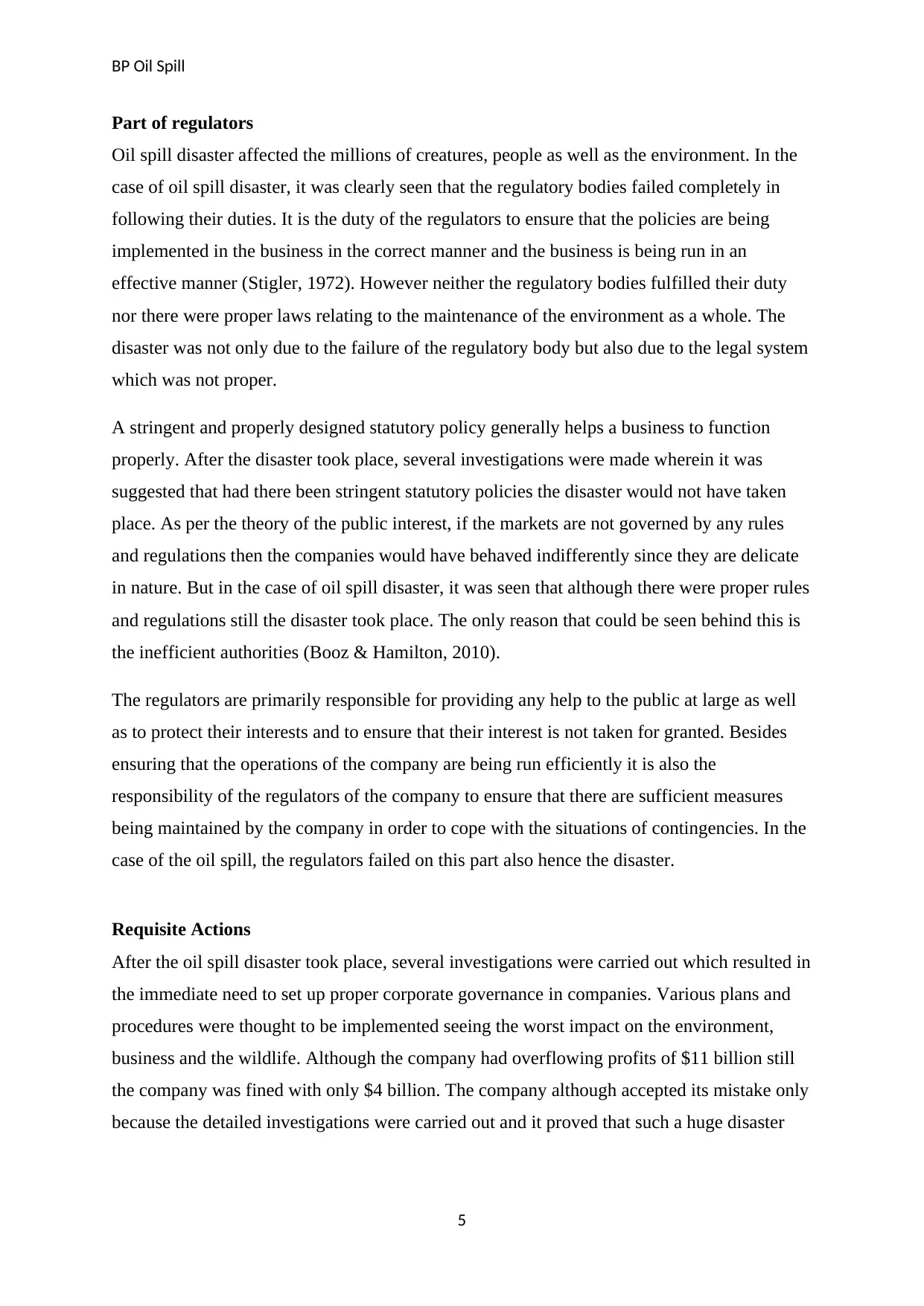
BP Oil Spill
Part of regulators
Oil spill disaster affected the millions of creatures, people as well as the environment. In the
case of oil spill disaster, it was clearly seen that the regulatory bodies failed completely in
following their duties. It is the duty of the regulators to ensure that the policies are being
implemented in the business in the correct manner and the business is being run in an
effective manner (Stigler, 1972). However neither the regulatory bodies fulfilled their duty
nor there were proper laws relating to the maintenance of the environment as a whole. The
disaster was not only due to the failure of the regulatory body but also due to the legal system
which was not proper.
A stringent and properly designed statutory policy generally helps a business to function
properly. After the disaster took place, several investigations were made wherein it was
suggested that had there been stringent statutory policies the disaster would not have taken
place. As per the theory of the public interest, if the markets are not governed by any rules
and regulations then the companies would have behaved indifferently since they are delicate
in nature. But in the case of oil spill disaster, it was seen that although there were proper rules
and regulations still the disaster took place. The only reason that could be seen behind this is
the inefficient authorities (Booz & Hamilton, 2010).
The regulators are primarily responsible for providing any help to the public at large as well
as to protect their interests and to ensure that their interest is not taken for granted. Besides
ensuring that the operations of the company are being run efficiently it is also the
responsibility of the regulators of the company to ensure that there are sufficient measures
being maintained by the company in order to cope with the situations of contingencies. In the
case of the oil spill, the regulators failed on this part also hence the disaster.
Requisite Actions
After the oil spill disaster took place, several investigations were carried out which resulted in
the immediate need to set up proper corporate governance in companies. Various plans and
procedures were thought to be implemented seeing the worst impact on the environment,
business and the wildlife. Although the company had overflowing profits of $11 billion still
the company was fined with only $4 billion. The company although accepted its mistake only
because the detailed investigations were carried out and it proved that such a huge disaster
5
Part of regulators
Oil spill disaster affected the millions of creatures, people as well as the environment. In the
case of oil spill disaster, it was clearly seen that the regulatory bodies failed completely in
following their duties. It is the duty of the regulators to ensure that the policies are being
implemented in the business in the correct manner and the business is being run in an
effective manner (Stigler, 1972). However neither the regulatory bodies fulfilled their duty
nor there were proper laws relating to the maintenance of the environment as a whole. The
disaster was not only due to the failure of the regulatory body but also due to the legal system
which was not proper.
A stringent and properly designed statutory policy generally helps a business to function
properly. After the disaster took place, several investigations were made wherein it was
suggested that had there been stringent statutory policies the disaster would not have taken
place. As per the theory of the public interest, if the markets are not governed by any rules
and regulations then the companies would have behaved indifferently since they are delicate
in nature. But in the case of oil spill disaster, it was seen that although there were proper rules
and regulations still the disaster took place. The only reason that could be seen behind this is
the inefficient authorities (Booz & Hamilton, 2010).
The regulators are primarily responsible for providing any help to the public at large as well
as to protect their interests and to ensure that their interest is not taken for granted. Besides
ensuring that the operations of the company are being run efficiently it is also the
responsibility of the regulators of the company to ensure that there are sufficient measures
being maintained by the company in order to cope with the situations of contingencies. In the
case of the oil spill, the regulators failed on this part also hence the disaster.
Requisite Actions
After the oil spill disaster took place, several investigations were carried out which resulted in
the immediate need to set up proper corporate governance in companies. Various plans and
procedures were thought to be implemented seeing the worst impact on the environment,
business and the wildlife. Although the company had overflowing profits of $11 billion still
the company was fined with only $4 billion. The company although accepted its mistake only
because the detailed investigations were carried out and it proved that such a huge disaster
5
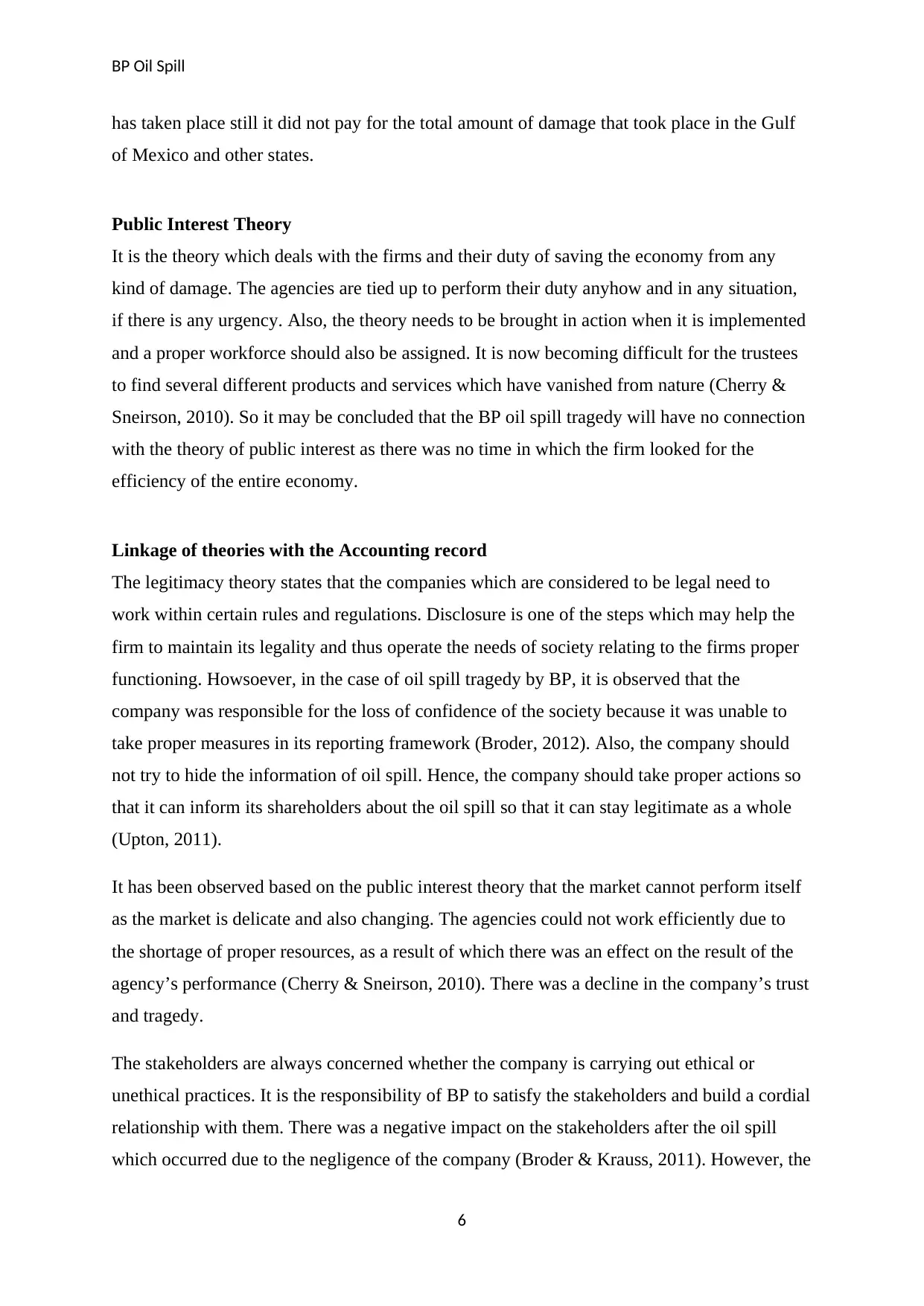
BP Oil Spill
has taken place still it did not pay for the total amount of damage that took place in the Gulf
of Mexico and other states.
Public Interest Theory
It is the theory which deals with the firms and their duty of saving the economy from any
kind of damage. The agencies are tied up to perform their duty anyhow and in any situation,
if there is any urgency. Also, the theory needs to be brought in action when it is implemented
and a proper workforce should also be assigned. It is now becoming difficult for the trustees
to find several different products and services which have vanished from nature (Cherry &
Sneirson, 2010). So it may be concluded that the BP oil spill tragedy will have no connection
with the theory of public interest as there was no time in which the firm looked for the
efficiency of the entire economy.
Linkage of theories with the Accounting record
The legitimacy theory states that the companies which are considered to be legal need to
work within certain rules and regulations. Disclosure is one of the steps which may help the
firm to maintain its legality and thus operate the needs of society relating to the firms proper
functioning. Howsoever, in the case of oil spill tragedy by BP, it is observed that the
company was responsible for the loss of confidence of the society because it was unable to
take proper measures in its reporting framework (Broder, 2012). Also, the company should
not try to hide the information of oil spill. Hence, the company should take proper actions so
that it can inform its shareholders about the oil spill so that it can stay legitimate as a whole
(Upton, 2011).
It has been observed based on the public interest theory that the market cannot perform itself
as the market is delicate and also changing. The agencies could not work efficiently due to
the shortage of proper resources, as a result of which there was an effect on the result of the
agency’s performance (Cherry & Sneirson, 2010). There was a decline in the company’s trust
and tragedy.
The stakeholders are always concerned whether the company is carrying out ethical or
unethical practices. It is the responsibility of BP to satisfy the stakeholders and build a cordial
relationship with them. There was a negative impact on the stakeholders after the oil spill
which occurred due to the negligence of the company (Broder & Krauss, 2011). However, the
6
has taken place still it did not pay for the total amount of damage that took place in the Gulf
of Mexico and other states.
Public Interest Theory
It is the theory which deals with the firms and their duty of saving the economy from any
kind of damage. The agencies are tied up to perform their duty anyhow and in any situation,
if there is any urgency. Also, the theory needs to be brought in action when it is implemented
and a proper workforce should also be assigned. It is now becoming difficult for the trustees
to find several different products and services which have vanished from nature (Cherry &
Sneirson, 2010). So it may be concluded that the BP oil spill tragedy will have no connection
with the theory of public interest as there was no time in which the firm looked for the
efficiency of the entire economy.
Linkage of theories with the Accounting record
The legitimacy theory states that the companies which are considered to be legal need to
work within certain rules and regulations. Disclosure is one of the steps which may help the
firm to maintain its legality and thus operate the needs of society relating to the firms proper
functioning. Howsoever, in the case of oil spill tragedy by BP, it is observed that the
company was responsible for the loss of confidence of the society because it was unable to
take proper measures in its reporting framework (Broder, 2012). Also, the company should
not try to hide the information of oil spill. Hence, the company should take proper actions so
that it can inform its shareholders about the oil spill so that it can stay legitimate as a whole
(Upton, 2011).
It has been observed based on the public interest theory that the market cannot perform itself
as the market is delicate and also changing. The agencies could not work efficiently due to
the shortage of proper resources, as a result of which there was an effect on the result of the
agency’s performance (Cherry & Sneirson, 2010). There was a decline in the company’s trust
and tragedy.
The stakeholders are always concerned whether the company is carrying out ethical or
unethical practices. It is the responsibility of BP to satisfy the stakeholders and build a cordial
relationship with them. There was a negative impact on the stakeholders after the oil spill
which occurred due to the negligence of the company (Broder & Krauss, 2011). However, the
6
⊘ This is a preview!⊘
Do you want full access?
Subscribe today to unlock all pages.

Trusted by 1+ million students worldwide
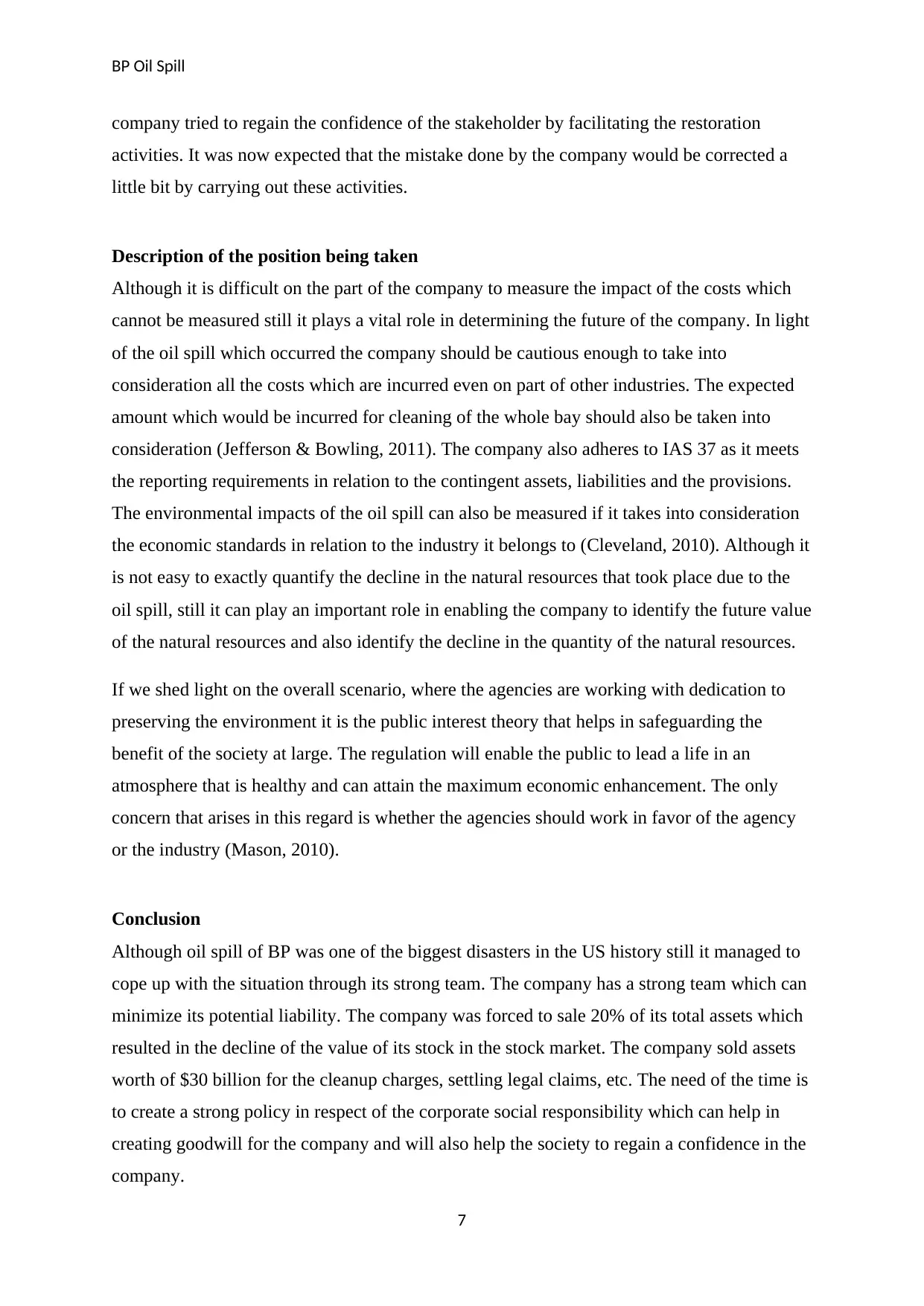
BP Oil Spill
company tried to regain the confidence of the stakeholder by facilitating the restoration
activities. It was now expected that the mistake done by the company would be corrected a
little bit by carrying out these activities.
Description of the position being taken
Although it is difficult on the part of the company to measure the impact of the costs which
cannot be measured still it plays a vital role in determining the future of the company. In light
of the oil spill which occurred the company should be cautious enough to take into
consideration all the costs which are incurred even on part of other industries. The expected
amount which would be incurred for cleaning of the whole bay should also be taken into
consideration (Jefferson & Bowling, 2011). The company also adheres to IAS 37 as it meets
the reporting requirements in relation to the contingent assets, liabilities and the provisions.
The environmental impacts of the oil spill can also be measured if it takes into consideration
the economic standards in relation to the industry it belongs to (Cleveland, 2010). Although it
is not easy to exactly quantify the decline in the natural resources that took place due to the
oil spill, still it can play an important role in enabling the company to identify the future value
of the natural resources and also identify the decline in the quantity of the natural resources.
If we shed light on the overall scenario, where the agencies are working with dedication to
preserving the environment it is the public interest theory that helps in safeguarding the
benefit of the society at large. The regulation will enable the public to lead a life in an
atmosphere that is healthy and can attain the maximum economic enhancement. The only
concern that arises in this regard is whether the agencies should work in favor of the agency
or the industry (Mason, 2010).
Conclusion
Although oil spill of BP was one of the biggest disasters in the US history still it managed to
cope up with the situation through its strong team. The company has a strong team which can
minimize its potential liability. The company was forced to sale 20% of its total assets which
resulted in the decline of the value of its stock in the stock market. The company sold assets
worth of $30 billion for the cleanup charges, settling legal claims, etc. The need of the time is
to create a strong policy in respect of the corporate social responsibility which can help in
creating goodwill for the company and will also help the society to regain a confidence in the
company.
7
company tried to regain the confidence of the stakeholder by facilitating the restoration
activities. It was now expected that the mistake done by the company would be corrected a
little bit by carrying out these activities.
Description of the position being taken
Although it is difficult on the part of the company to measure the impact of the costs which
cannot be measured still it plays a vital role in determining the future of the company. In light
of the oil spill which occurred the company should be cautious enough to take into
consideration all the costs which are incurred even on part of other industries. The expected
amount which would be incurred for cleaning of the whole bay should also be taken into
consideration (Jefferson & Bowling, 2011). The company also adheres to IAS 37 as it meets
the reporting requirements in relation to the contingent assets, liabilities and the provisions.
The environmental impacts of the oil spill can also be measured if it takes into consideration
the economic standards in relation to the industry it belongs to (Cleveland, 2010). Although it
is not easy to exactly quantify the decline in the natural resources that took place due to the
oil spill, still it can play an important role in enabling the company to identify the future value
of the natural resources and also identify the decline in the quantity of the natural resources.
If we shed light on the overall scenario, where the agencies are working with dedication to
preserving the environment it is the public interest theory that helps in safeguarding the
benefit of the society at large. The regulation will enable the public to lead a life in an
atmosphere that is healthy and can attain the maximum economic enhancement. The only
concern that arises in this regard is whether the agencies should work in favor of the agency
or the industry (Mason, 2010).
Conclusion
Although oil spill of BP was one of the biggest disasters in the US history still it managed to
cope up with the situation through its strong team. The company has a strong team which can
minimize its potential liability. The company was forced to sale 20% of its total assets which
resulted in the decline of the value of its stock in the stock market. The company sold assets
worth of $30 billion for the cleanup charges, settling legal claims, etc. The need of the time is
to create a strong policy in respect of the corporate social responsibility which can help in
creating goodwill for the company and will also help the society to regain a confidence in the
company.
7
Paraphrase This Document
Need a fresh take? Get an instant paraphrase of this document with our AI Paraphraser
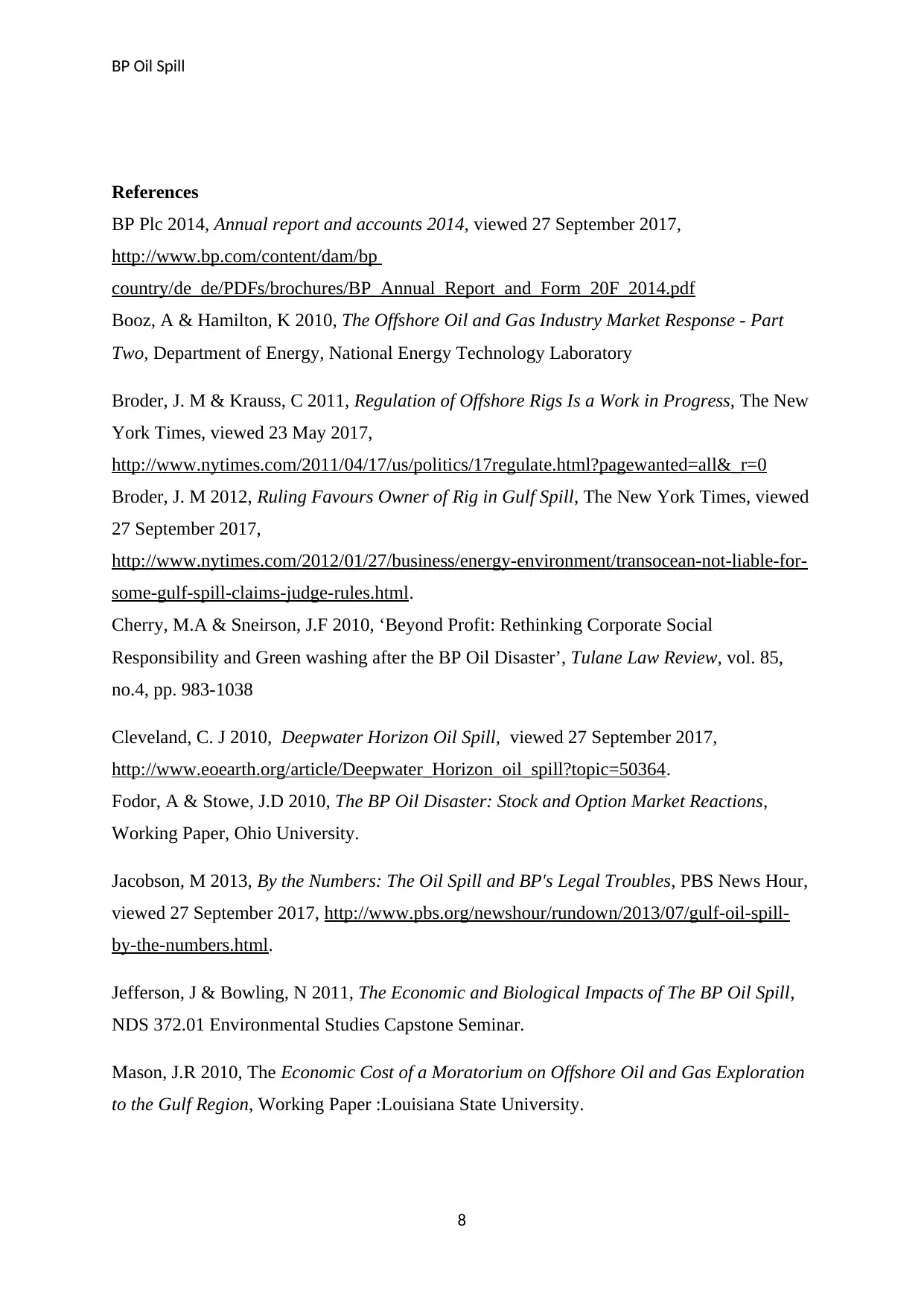
BP Oil Spill
References
BP Plc 2014, Annual report and accounts 2014, viewed 27 September 2017,
http://www.bp.com/content/dam/bp
country/de_de/PDFs/brochures/BP_Annual_Report_and_Form_20F_2014.pdf
Booz, A & Hamilton, K 2010, The Offshore Oil and Gas Industry Market Response - Part
Two, Department of Energy, National Energy Technology Laboratory
Broder, J. M & Krauss, C 2011, Regulation of Offshore Rigs Is a Work in Progress, The New
York Times, viewed 23 May 2017,
http://www.nytimes.com/2011/04/17/us/politics/17regulate.html?pagewanted=all&_r=0
Broder, J. M 2012, Ruling Favours Owner of Rig in Gulf Spill, The New York Times, viewed
27 September 2017,
http://www.nytimes.com/2012/01/27/business/energy-environment/transocean-not-liable-for-
some-gulf-spill-claims-judge-rules.html.
Cherry, M.A & Sneirson, J.F 2010, ‘Beyond Profit: Rethinking Corporate Social
Responsibility and Green washing after the BP Oil Disaster’, Tulane Law Review, vol. 85,
no.4, pp. 983-1038
Cleveland, C. J 2010, Deepwater Horizon Oil Spill, viewed 27 September 2017,
http://www.eoearth.org/article/Deepwater_Horizon_oil_spill?topic=50364.
Fodor, A & Stowe, J.D 2010, The BP Oil Disaster: Stock and Option Market Reactions,
Working Paper, Ohio University.
Jacobson, M 2013, By the Numbers: The Oil Spill and BP's Legal Troubles, PBS News Hour,
viewed 27 September 2017, http://www.pbs.org/newshour/rundown/2013/07/gulf-oil-spill-
by-the-numbers.html.
Jefferson, J & Bowling, N 2011, The Economic and Biological Impacts of The BP Oil Spill,
NDS 372.01 Environmental Studies Capstone Seminar.
Mason, J.R 2010, The Economic Cost of a Moratorium on Offshore Oil and Gas Exploration
to the Gulf Region, Working Paper :Louisiana State University.
8
References
BP Plc 2014, Annual report and accounts 2014, viewed 27 September 2017,
http://www.bp.com/content/dam/bp
country/de_de/PDFs/brochures/BP_Annual_Report_and_Form_20F_2014.pdf
Booz, A & Hamilton, K 2010, The Offshore Oil and Gas Industry Market Response - Part
Two, Department of Energy, National Energy Technology Laboratory
Broder, J. M & Krauss, C 2011, Regulation of Offshore Rigs Is a Work in Progress, The New
York Times, viewed 23 May 2017,
http://www.nytimes.com/2011/04/17/us/politics/17regulate.html?pagewanted=all&_r=0
Broder, J. M 2012, Ruling Favours Owner of Rig in Gulf Spill, The New York Times, viewed
27 September 2017,
http://www.nytimes.com/2012/01/27/business/energy-environment/transocean-not-liable-for-
some-gulf-spill-claims-judge-rules.html.
Cherry, M.A & Sneirson, J.F 2010, ‘Beyond Profit: Rethinking Corporate Social
Responsibility and Green washing after the BP Oil Disaster’, Tulane Law Review, vol. 85,
no.4, pp. 983-1038
Cleveland, C. J 2010, Deepwater Horizon Oil Spill, viewed 27 September 2017,
http://www.eoearth.org/article/Deepwater_Horizon_oil_spill?topic=50364.
Fodor, A & Stowe, J.D 2010, The BP Oil Disaster: Stock and Option Market Reactions,
Working Paper, Ohio University.
Jacobson, M 2013, By the Numbers: The Oil Spill and BP's Legal Troubles, PBS News Hour,
viewed 27 September 2017, http://www.pbs.org/newshour/rundown/2013/07/gulf-oil-spill-
by-the-numbers.html.
Jefferson, J & Bowling, N 2011, The Economic and Biological Impacts of The BP Oil Spill,
NDS 372.01 Environmental Studies Capstone Seminar.
Mason, J.R 2010, The Economic Cost of a Moratorium on Offshore Oil and Gas Exploration
to the Gulf Region, Working Paper :Louisiana State University.
8
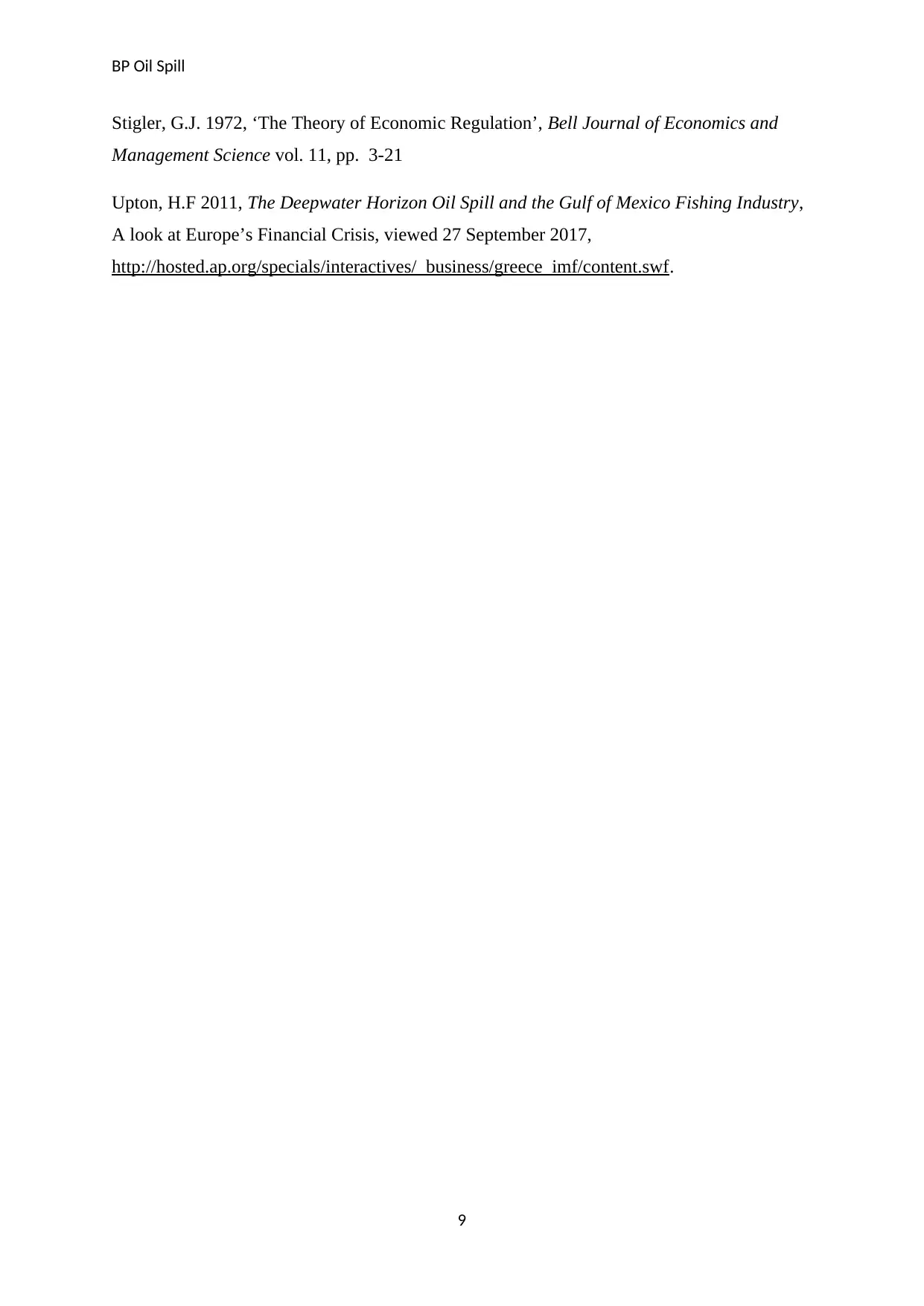
BP Oil Spill
Stigler, G.J. 1972, ‘The Theory of Economic Regulation’, Bell Journal of Economics and
Management Science vol. 11, pp. 3-21
Upton, H.F 2011, The Deepwater Horizon Oil Spill and the Gulf of Mexico Fishing Industry,
A look at Europe’s Financial Crisis, viewed 27 September 2017,
http://hosted.ap.org/specials/interactives/_business/greece_imf/content.swf.
9
Stigler, G.J. 1972, ‘The Theory of Economic Regulation’, Bell Journal of Economics and
Management Science vol. 11, pp. 3-21
Upton, H.F 2011, The Deepwater Horizon Oil Spill and the Gulf of Mexico Fishing Industry,
A look at Europe’s Financial Crisis, viewed 27 September 2017,
http://hosted.ap.org/specials/interactives/_business/greece_imf/content.swf.
9
⊘ This is a preview!⊘
Do you want full access?
Subscribe today to unlock all pages.

Trusted by 1+ million students worldwide
1 out of 9
Related Documents
Your All-in-One AI-Powered Toolkit for Academic Success.
+13062052269
info@desklib.com
Available 24*7 on WhatsApp / Email
![[object Object]](/_next/static/media/star-bottom.7253800d.svg)
Unlock your academic potential
Copyright © 2020–2026 A2Z Services. All Rights Reserved. Developed and managed by ZUCOL.





